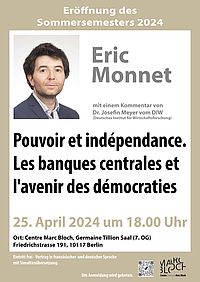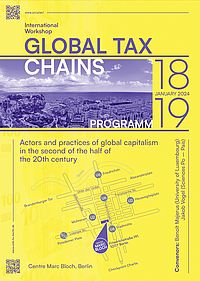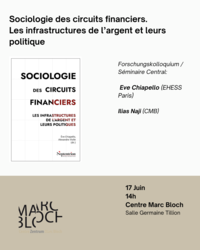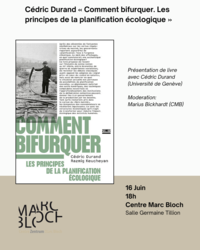Wirtschaftsreihe
Cycle Économie / Wirtschaftsreihe
Mit seiner Wirtschaftsreihe begibt sich das Centre Marc Bloch in eine interdisziplinäre Perspektive gesellschaftlicher Herausforderungen von allerhöchstem Rang. Im Gegensatz zu einer Perspektive, die wirtschaftliche Aktivitäten als autonomen Raum behandelt, zielen die in der Wirtschaftsreihe vorgestellten Arbeiten darauf ab, die Kapitalakkumulation und die Märkte wieder mit ihrer Geschichtlichkeit, ihrer Einbettung in die Gesellschaften, ihrer Interaktion mit den Regulierungsinstitutionen und ihren Auswirkungen auf die Lebens- und Arbeitsbedingungen zu verbinden. Zu den Themen der angebotenen Seminare, Konferenzen und Studientage zählen die Legitimation der politischen Ordnung, Dynamiken der Globalisierung, die Neugestaltung der sozialen Sicherung und letztlich das Gesellschaftsmodell und die Zukunft der Demokratie.
Veranstaltungen
Post growth, banks and finance. June 6 and 7 2024
The themes of degrowth and post-growth are increasingly debated in the academic world. Research communities are studying them from a variety of theoretical perspectives and with a variety of objectives. To limit global warming and preserve planetary limits, an empirical consensus is emerging on the need for a significant decrease in the flow of materials extracted, circulated and discharged by economies, which is difficult to separate from a decrease in their GDPs.
A consequent stream of research exists on money and growth, but this literature focuses relatively little on the banking and financial sectors. Yet these sectors play a central role in the creation, destruction and circulation of currencies, which frame the possibility of climate policies (where to find the money? one of the answers lies in money creation, cf. the IRA in the USA). The institutions in these sectors, through their regulatory standards (capital investments according to risk levels) and business models (acceptable risk levels), constrain and direct the volumes of investments earmarked for "green" investments, for example in renewable energies, energy and resource-saving devices and technologies.
Banks are making "green" investments. These are monetary creations aimed at making activities more sustainable. The issue of transforming entire economies according to sustainability criteria is not currently considered by the banking and financial sector. The decline in the material flows of economies, for example, would be accompanied, depending on the sector, by a decline or growth in financing flows from banks and the finance sector. A number of questions can be formulated on the basis of these elements. For the banking and finance sector, they concern:
-the diagnosis of sustainability conditions in relation to material flows and GDP growth,
-the compatibility of sustainability with the business models and profit rates of the banking and financial sectors.
-the interweaving of the banking and financial sectors in the evolution of forms of capitalism "compatible" with the ecological transition.
-methodological and epistemological questions concerning the scientific, political and "future" character of forms of economic organization in the banking and financial sector, as called for by research currents on de/post-growth.
Organised by Ilias Naji
Conférence inaugurale - Eric Monnet 25. April 2024 | 18:00

Eric Monnet wird seine neue Publikation "Balance of Power. Central Banks and the Fate of Democracy" vorstellen, die im April 2024 veröffentlicht wird. Die Präsentation findet auf Französisch statt und wird von Dr. Josefin Meyer vom Deutschen Institut für Wirtschaftsforschung (DIW) kommentiert.
International Workshop: GLOBAL TAX CHAINS 18. Januar 2024 | 14:00

Actors and practices of global capitalism in the second of the half of the 20th century
As chains of wealth became global in the world economy (Seabroke&Wigan, 2022) so did tax strategies. These topics have gained increased attention in the last fifteen years as the crisis of 2007/2008 renewed the discussion on inequalities and (fiscal) justice. Humanities and Social Sciences played an important role in framing debates on this topic. Wealth was perhaps less produced by manufacturing cars or building houses than by moving capital across jurisdictions, creating multi jurisdictional spaces where national states, global companies, local financial plumbers and international organisations created, maintained and governed global tax chains. This workshop has a dual purpose. On the one hand, it intends to take stock of these ongoing international and interdisciplinary debates. On the other hand, it intends to deepen the historical dimensions to phenomena that are beginning to be well documented for today's world, but still sometimes lack temporal depth.
Organised by Benoît Majerus and Jakob Vogel at Center Marc Bloch Berlin
Tagung "Social Innovation" 14. Dezember 2023 | 09:30
Das Konzept der sozialen Innovation hat sich in den letzten zwei Jahrzehnten im Rahmen der Aktivitäten der OECD und der Europäischen Union weitgehend durchgesetzt. Sie wird dabei jeweils unterschiedlich definiert. Vielfach zeigt sich dabei ein normativer Anstatz des Konzepts.
Der Workshop, der von 9:30 bis 16:30 Uhr am CMB stattfindet, widmet sich dem Thema Soziale Innovation aus Sicht der Wissenschaft und Praxis in deutsch-französischer und europäischer Perspektive. Rund zehn Wissenschaftler:innen und Praktiker:innen diskutieren das Thema auf Englisch. Der Workshop besteht aus einer Keynote und zwei Diskussionsrunden. Der Hauptvortrag (Simone Baglione, Università di Parma) eröffnet das Thema mit einem vergleichenden europäische Zugang, indem die verschiedenen Definitionen und Maßnahmen zur Förderung sozialer Innovation vorgestellt und der konzeptionelle Rahmen absteckt wird. Danach folgen zwei Diskussionsrunden zu den Themen (i) soziale Eingliederung von Menschen mit Behinderungen und (ii) Migration und Arbeitsmarkt.

